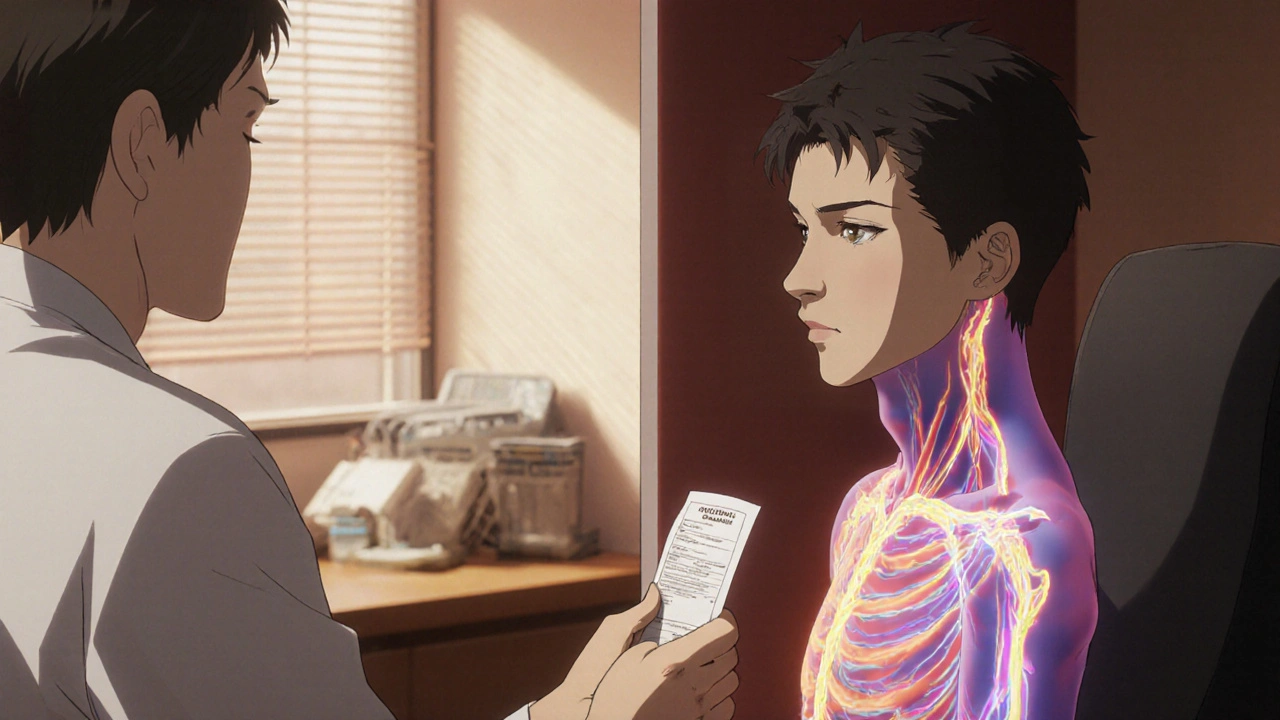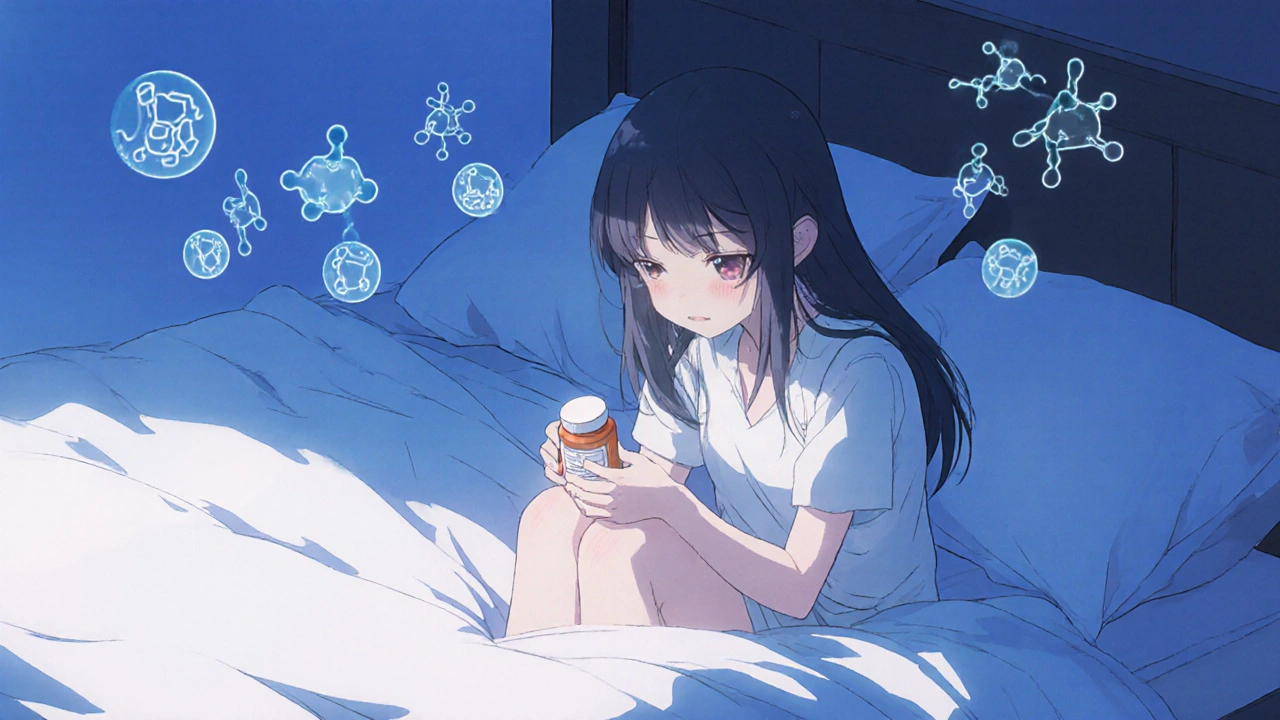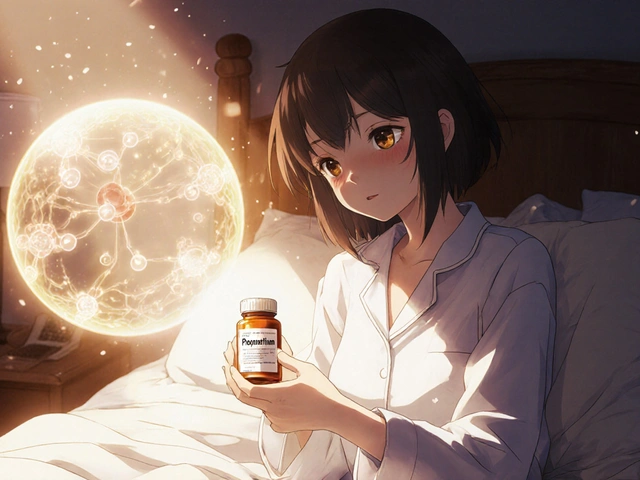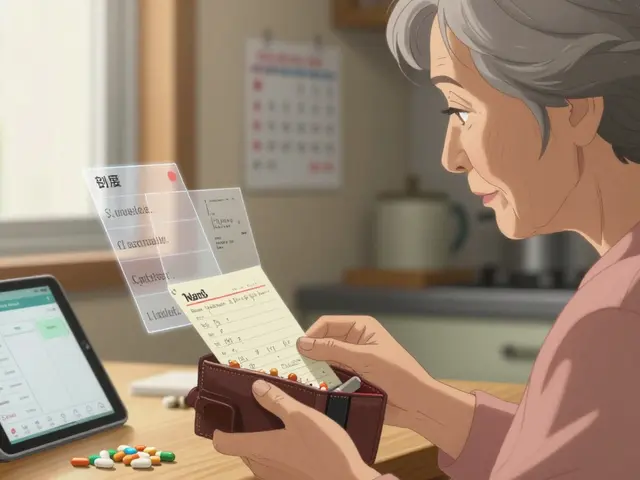Medication Side Effect Checker
Select a Condition
Medications with Higher Sexual Side Effects
Medications with Lower Sexual Side Effects
What You Can Do
- Discuss your concerns with your doctor
- Ask about alternative medications
- Consider a drug holiday under medical supervision
- Ask about adding a helper medication like sildenafil
Many people don’t realize that common prescriptions can quietly affect their sex life. If you’ve noticed a drop in desire, trouble getting or keeping an erection, delayed orgasm, or even numbness during intimacy, it might not be stress or aging-it could be your medication. Sexual side effects from drugs are far more common than most doctors admit, and they’re one of the top reasons people stop taking their prescriptions.
Antidepressants Are the Biggest Culprit
If you’re on an SSRI like sertraline (Zoloft), fluoxetine (Prozac), or paroxetine (Paxil), you’re among the 25% to 73% of users who experience sexual side effects. These drugs increase serotonin, which helps with mood-but too much serotonin can shut down sexual response. Paroxetine has the highest risk, with up to 65% of users reporting problems. Fluvoxamine and sertraline aren’t far behind, at 59% and 56% respectively.It’s not just men. Women report reduced libido, trouble with arousal, and inability to orgasm. One study found clomipramine, a tricyclic antidepressant, caused total or partial anorgasmia in 93% of patients. That’s not rare-it’s expected.
But not all antidepressants are equal. Bupropion (Wellbutrin) and mirtazapine (Remeron) are much gentler on sexual function. Many doctors now start patients on these if sexual health is a priority. If you’re struggling, switching isn’t weakness-it’s smart medicine.
High Blood Pressure Pills Can Kill Your Sex Drive
Heart medications are another hidden source of sexual problems. Thiazide diuretics like hydrochlorothiazide (Microzide) are the most common cause of erectile dysfunction among antihypertensives. Beta blockers like atenolol also reduce blood flow and lower libido. About 10% of heart failure patients say their sexual issues come directly from meds like digoxin or spironolactone.Women are affected too. Up to 41% report less desire, and 34% say sex just doesn’t feel good anymore. But here’s something surprising: some blood pressure drugs actually help. Angiotensin II receptor blockers like valsartan have been linked to improved sexual desire and fantasies in women-unlike beta blockers, which make things worse. If you’re on a beta blocker and your sex life has tanked, ask your doctor if switching to an ARB is an option.
Prostate Medicines Don’t Just Shrink Glands
Men taking finasteride (Propecia, Proscar) or dutasteride for hair loss or enlarged prostate often notice a drop in libido, trouble with erections, or dry orgasms. These drugs block DHT, a hormone tied to both hair growth and sexual function. Studies show 5.9-15.8% of users lose desire, 5.1-9% get erectile dysfunction, and up to 21.4% report ejaculation issues.For men with prostate cancer, antiandrogens like bicalutamide are even harsher. Nearly everyone on these drugs loses libido and struggles with erections. Some even develop breast tissue growth (gynecomastia). These aren’t side effects-they’re expected outcomes. That’s why doctors talk about them upfront. If you’re starting treatment, ask for counseling. Knowing what’s coming helps you cope.

Other Surprising Offenders
You might not think about epilepsy drugs, opioids, or heartburn pills-but they can mess with your sex life too.Gabapentin and pregabalin, used for nerve pain and seizures, are linked to lower testosterone and erectile dysfunction. Opioids like oxycodone shut down the hypothalamic-pituitary-gonadal axis, leading to low testosterone and impotence. Even proton pump inhibitors (PPIs) like omeprazole have been tied to reduced libido in some users, though the mechanism isn’t fully understood.
And yes, it’s not just men. Women on long-term PPIs report lower arousal and satisfaction. It’s not always the drug itself-it’s how your body reacts. Everyone’s different.
What Can You Do?
Never stop a medication cold turkey. Withdrawal can be dangerous. But you don’t have to suffer in silence.- Talk to your doctor-not your partner, not Google. Tell them exactly what’s happening. Use phrases like, “I’ve noticed my sex drive has dropped since I started this med.”
- Ask about alternatives. Is there a drug in the same class with fewer sexual side effects? Could you switch from paroxetine to bupropion? From atenolol to valsartan?
- Try a drug holiday. For some SSRIs, taking a short break on weekends under medical supervision can help restore function without losing mood control.
- Consider adding a helper. Sildenafil (Viagra) works for about 74-95% of men with SSRI-induced erectile dysfunction. It’s not a fix for low desire, but it can restore confidence.
- Move more. Exercise improves blood flow, boosts testosterone, and reduces stress. Even 30 minutes of walking daily can make a difference.
- Time your dose. Some people find taking SSRIs after sex reduces interference with arousal and orgasm.

Why This Isn’t Talked About More
Doctors often assume patients won’t bring it up. Patients feel embarrassed. It’s a silent crisis. But here’s the truth: if you’re on a long-term medication, sexual side effects are likely. One study found 59.1% of people on antidepressants had sexual dysfunction. That’s more than half.And it’s not just about pleasure. It’s about relationships, self-esteem, and mental health. A man who can’t get an erection might feel like a failure. A woman who can’t orgasm might think something’s wrong with her. Often, it’s just the pill.
The FDA now requires drug makers to report sexual side effects in clinical trials. The American Urological Association recommends screening for them during routine checkups. Progress is slow-but it’s happening.
When to Worry
Most sexual side effects are reversible once you stop or switch the drug. But some are serious and need immediate attention:- Priapism-a painful, lasting erection (more than 4 hours). This is a medical emergency.
- Painful ejaculation or penile numbness-could signal nerve damage.
- Sudden loss of sensation in the vagina or nipples-rare, but documented with SSRIs.
If you experience any of these, contact your doctor right away. Don’t wait.
The Bigger Picture
Medications save lives. But they don’t come with a warning label that says, “May ruin your sex life.” That’s the gap. We focus on heart attacks and seizures, but not on whether someone can still feel close to their partner.The future is better. New antidepressants are being designed to avoid serotonin overload. Genetic tests may one day predict who’s more likely to have these side effects. For now, the best tool you have is your voice.
If you’re on medication and your sex life has changed, you’re not alone. And you don’t have to live with it.
Can antidepressants cause permanent sexual side effects?
In most cases, sexual side effects from antidepressants go away after stopping the drug. But a small number of people report persistent symptoms-even after discontinuation. This is called Post-SSRI Sexual Dysfunction (PSSD). It’s rare, poorly understood, and not yet fully recognized by all doctors. If you notice ongoing issues after stopping an SSRI, document your symptoms and seek a specialist in sexual medicine.
Do all SSRIs cause the same sexual side effects?
No. While all SSRIs can affect sexual function, they vary in risk. Paroxetine has the highest rate (up to 65%), followed by fluvoxamine and sertraline. Fluoxetine has a slightly lower risk, and escitalopram tends to be milder. Bupropion and mirtazapine are not SSRIs and carry much lower risk. If sexual health matters to you, ask your doctor which SSRI has the best profile for your needs.
Can I take Viagra with my antidepressant?
Yes, many people safely take sildenafil (Viagra) with SSRIs to treat erectile dysfunction. Studies show it works for 74-95% of men with SSRI-induced ED. But you need your doctor’s approval. Combining medications can affect blood pressure or cause rare interactions. Never self-prescribe. Your doctor will check your heart health and current meds before approving it.
Why do blood pressure meds affect sex drive?
Many blood pressure drugs reduce blood flow or lower hormone levels. Diuretics flush out fluids and electrolytes, which can reduce arousal. Beta blockers slow heart rate and block adrenaline, making it harder to get aroused. Some also lower testosterone. The good news? Not all antihypertensives do this. ARBs like valsartan and calcium channel blockers like amlodipine are less likely to cause sexual problems-and may even improve them.
Should I stop my medication if I’m having sexual side effects?
Never stop a prescribed medication without talking to your doctor. Stopping antidepressants or blood pressure drugs suddenly can cause dangerous withdrawal, rebound hypertension, or worsening of your original condition. Instead, schedule an appointment. Bring your concerns. Ask for alternatives. There are almost always options that protect both your mental and sexual health.
Are there natural remedies that help with medication-induced sexual dysfunction?
Exercise is the most proven natural remedy. Regular physical activity improves circulation, boosts testosterone, and reduces stress-all of which help sexual function. Some people report benefits from L-arginine or ginseng, but evidence is weak and interactions with meds are possible. Don’t rely on supplements as a fix. Talk to your doctor first. The real solution is often adjusting your prescription, not adding something new.







Matthew King
October 29, 2025 AT 13:46caroline howard
October 29, 2025 AT 22:33Melissa Thompson
October 30, 2025 AT 12:12Rika Nokashi
October 31, 2025 AT 01:20Don Moore
November 1, 2025 AT 20:18Austin Levine
November 3, 2025 AT 10:39Andrea Swick
November 4, 2025 AT 18:03Joe Puleo
November 6, 2025 AT 16:31Michael Lynch
November 7, 2025 AT 07:08Ben Jackson
November 8, 2025 AT 01:00Keith Bloom
November 9, 2025 AT 11:42Matthew King
November 11, 2025 AT 04:53